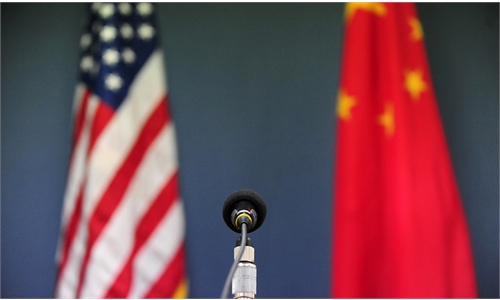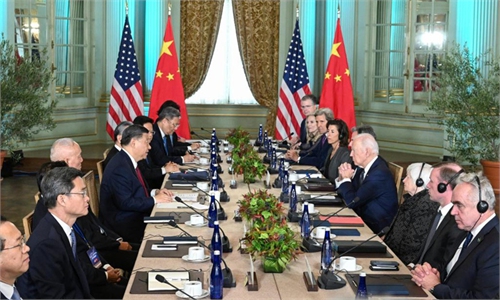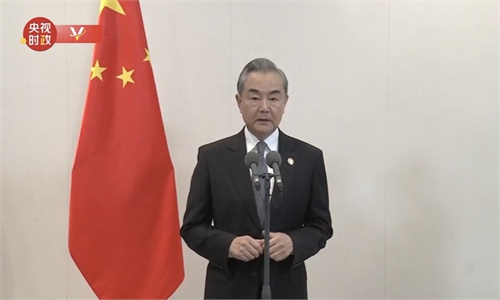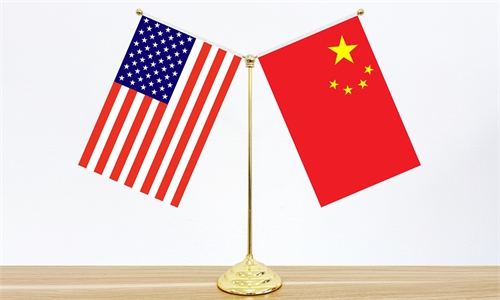Future of China-US relations created by people: President Xi
Warmly welcomed speech aims to eliminate misunderstandings, paves way for more trade exchanges
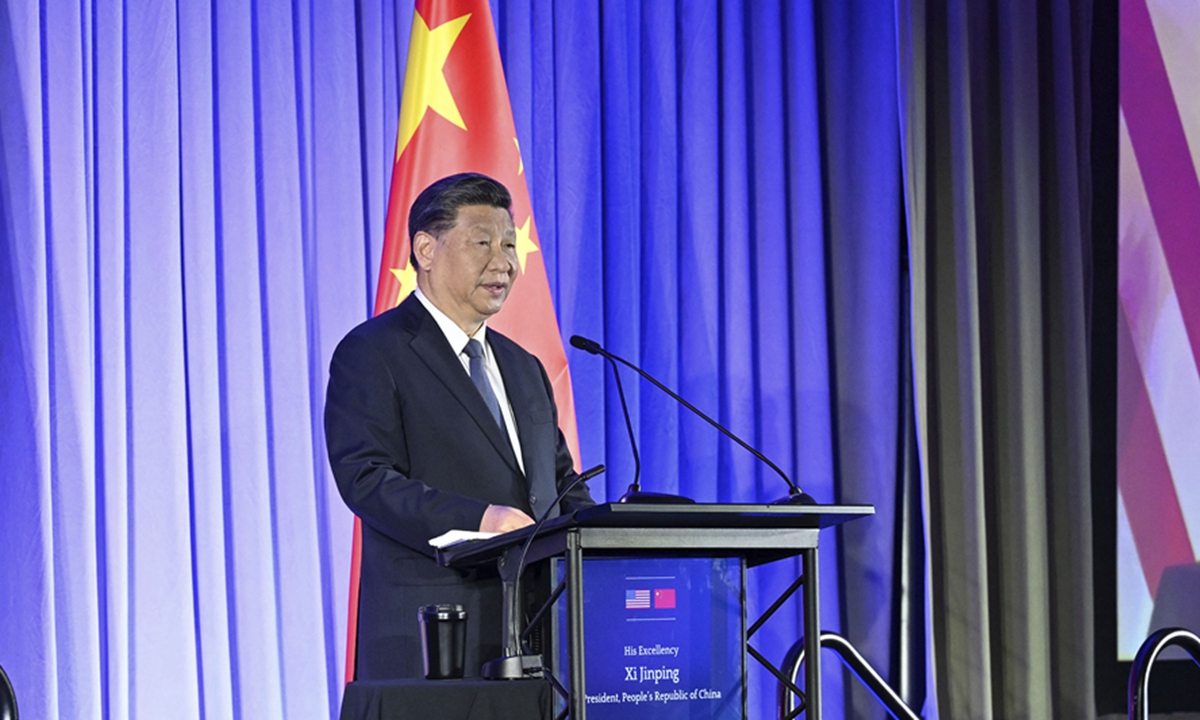
Chinese President Xi Jinping delivers a speech at a welcoming dinner hosted by friendly organizations in the US, including the US-China Business Council and the National Committee on US-China Relations, in San Francisco on local time November 15, 2023. Photo: Xinhua
The future of China-US relations is created by the peoples of the two nations, Chinese President Xi Jinping told a gathering of representatives from different communities in the US on Wednesday evening, noting that China is willing to be "a partner and a friend" of the US.The remarks were delivered at a welcoming dinner hosted by friendly organizations in the US, including the US-China Business Council and the National Committee on US-China Relations, with the attendance of US top executives such as Tesla's Elon Musk and Apple's Tim Cook.
"The foundation of China-US relations was laid by our peoples, … the door of China-US relations was opened by our peoples, … the stories of China-US relations are written by our peoples, … the future of China-US relations will be created by our peoples," Xi said. "We should build more bridges and pave more roads for people-to-people interactions. We must not erect barriers or create a chilling effect."
President Xi's face-to-face talks with the attendees will eliminate some US businesses' misunderstandings of China's policy - which has long been "smeared and misinterpreted" by some foreign media, and will also help to rebuild trust and bridge more cooperation that will benefit both economies, observers said.
Moreover, the reception dinner, featuring many from US business communities and coming just hours after Xi's summit meeting with US President Joe Biden, also indicates that trade cooperation with the US as well as a commitment to opening-up remain one of the most "significant agendas" of the Chinese leadership, Gao Lingyun, an expert at the Chinese Academy of Social Sciences in Beijing, told the Global Times on Thursday.
Warmly welcomed
In his speech, Xi said the most fundamental question shaping US-China relations is whether the countries are rivals or partners. "If we regard each other as the biggest rival, the most significant geopolitical challenge and an ever-pressing threat, it will inevitably lead to wrong policies, wrong actions and wrong results," Xi told the audience.
"China is willing to be a partner and a friend of the US," he remarked.
The speech was applauded many times, suggesting the talk is a success, said attendees of the meeting reached by the Global Times on Wednesday, noting that many in the US knows China through the media, but an interaction like this will help them know the true China - friendly and peaceful rather than "hostile."
A great speech and communication like this is very helpful, Ray Dalio, founder of Bridgewater Associates, who attended the dinner, told the Global Times on Wednesday.
At the moment, the main thing for China-US ties is "don't be prejudiced, mutual understanding, and co-existence," Dalio said.
"I hope China and the US can work together for richer prosperity of the world," Tesla's CEO Elon Musk, who made a trip to China just months ago, said after the dinner, according to a report from the Xinhua News Agency.
Others on the guest list also included executive chairman of NIKE, CEO of Pfizer, CEO of Qualcomm, chair of Mastercard, among others.
The dinner was very animated among the US company executives. A Bloomberg report said that executives were "scrambling" for seats or to be put on a waiting list for the dinner to meet with the Chinese president, citing people familiar with the situation.
"Some on the waiting list even waiting outside of the dinner venue in hopes of securing a last-minute opportunity to dine with the Chinese president," said the above-quoted person, who asked to remain anonymous.
Apart from business executives, a group of Chinese President Xi's "old friends" also attended the dinner. For instance, Gary Dvorchak, son of Eleanor and Thomas Dvorchak, the family that hosted Xi during his 1985 visit to Muscatine, was also in attendance.
Gary Dvorchak, who is now also doing businesses in the US and China, told the Global Times that Xi sent the message of openness in commerce and economics. He said that the Chinese government definitely has a policy of encouraging investment and trade.
According to Dvorchak, his family developed amiable friendship with Xi after his visit in 1985. In his description, Xi will join those old friends in family talks which are not political but shows sincere caring for them.
Bumpy road ahead
The lively atmosphere at the event makes it difficult to imagine that the economic relationship between the world's two largest economies is currently facing very challenging times. The retaliatory tariffs imposed by the US government against Chinese imports have not been lifted, and there are additional efforts to exert pressure on Chinese high-tech enterprises, citing the so-called national security reasons.
Experts also noted that although cooperation and two-way investment is in the interest of willingness of businesses from both sides, challenges remain serious.
"The US government should be clear and forceful that it applauds US firms doing trade or investment with China outside national security areas," Gary Hufbauer, a nonresident senior fellow at the Washington-based Peterson Institute for International Economics, told the Global Times.
Economic and trade relations in the China-US ties are crucial, Hufbauer said. "By our calculations, US-China trade provides a strong spur to economic growth in both countries. We estimate that a $100 billion increase in bilateral trade results in a $30 billion growth in GDP in each country. Bilateral foreign direct investment generates more gains."
Conversely, US congressional "China hawks" who seek to decouple our two economies would make both countries poorer if their goals were realized, said Hufbauer.
The trade frictions and barriers established are unlikely to change substantively in the short term, Sun Taiyi, assistant professor of Political Science at Christopher Newport University, told the Global Times on Wednesday.
Of course, against this backdrop, there is still room for cooperation that the US and China can jointly explore, especially since the economy is not a zero-sum game, and stabilizing prices and growth are common goals for both, Sun said.
"We are in an era of challenges and changes. But it is also an era of hope. The world needs China and the US to work together for a better future. We, the largest developing country and the largest developed country, must handle our relations well. In a world of changes and chaos, it is ever more important for us to have the mind, assume the vision, shoulder the responsibility, and play the role that come along with our status as major countries," Xi said in his remarks at the dinner reception.


